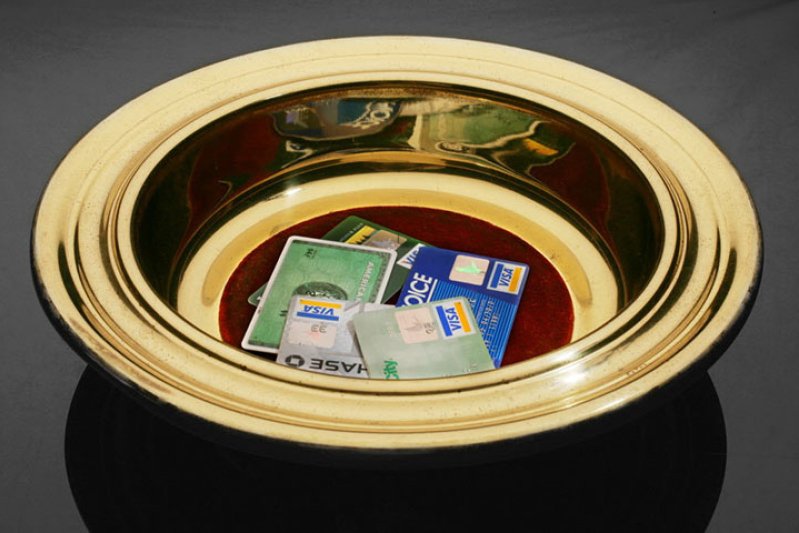
If you're still scrounging for bills or coins to throw into your church's collection plate each week, you may be surprised to hear that many churches are now accepting electronic payments, too.
Carrying cash or a checkbook is becoming more and more scarce for many of us these days, but credit cards are a common component in any wallet or purse. Many churches are updating their payment options to include credit card payments, but TechSoup is going even further by giving churches the necessary set-up tools to get them caught up with these technologically advanced times.
We sat down with Jim Lynch, TechSoup's Director of Green Technology to discuss TechSoup's goal and mission with churches and other non-profit religious instritution to find out how electronic payments can help both the churches and the congregations.
The Gospel Herald: Can you explain a bit about how electronic donations work? What device(s) would be needed from perishioners?
Jim Lynch: There are now lots of tech tools to collect offerings by church members in different ways. Since 2006, there have been specialty companies like SecureGive and EasyTithe that make giving kiosks or ATMs. In my piece, "How Churches Can Go High Tech with the Collection Plate" we have a photo of a PayAnywhere Storefront credit card reader device that can sit on a table in a church lobby for accepting credit and debit card donations. It's as easy to use as paying for groceries at the store.
TGH: Is this something that can be done each week during the service (with something like Apple Pay, etc), or would it need to be done in advance weekly or monthly?
Lynch: Certainly accepting credit and debit card payments is easily done now each week during, before, or after the service. It can also be effectively done as a pledge process in which church members fill out a card either online or just as a paper form if they want to have their donation automatically paid each month. An example of that is the All Saints Episcopal Church pledge page. The United Way of Greater Nashua New Hampshire has excellent step-by-step directions on how to set up a payroll deduction system. Having both an on the spot donation kiosk and a monthly auto pay system is optimum these days. On Apple Pay, I think I'd recommend waiting on implementing that until it's clearer that it will take off. It very well may, but mobile payment services like Google Wallet, Square, Intuit Pay, and PayPal Mobile Payments haven't really taken off because it's just not that hard to swipe a credit card.
TGH: From the church's standpoint, how easy would it be to accept electronic payments from its congregation?
Lynch: I've seen PayPal buttons on lots of church websites. That is one of the easiest ways to accept online donations. I like the WikiHow directions on how to set that up. It's also very easy to get going with one of the giving kiosk companies like the PayAnywhere Storefront I mentioned. The equipment is free, and PayAnywhere charges a 1.7% fee per swipe. To use those, a church would need Internet wherever they want to place the kiosk. I like those devices because they guarantee secure transactions.
TGH: How can this type of payment system best benefit the church and the one making the donation?
Lynch: As I mentioned in my piece on going high tech collection plate, a clear and growing trend these days is for everyone to pay for things more with credit and debit cards and less with cash and checks. I'm sorry I didn't say it in the article that it's also a good idea to keep collecting cash, checks, and paper pledges in an actual collection plate if congregations seem to like that. It's just that it's now inexpensive and easy to provide other ways to donate via online and using giving kiosks. People may well prefer to do it that way as time goes on in accord with the larger trend I mentioned. I'd like to know how many churches are now dispensing entirely with the actual collection plate. That would be fascinating to find out.
TGH: How can TechSoup make a greater impact on church and nonprofit communities?
Lynch: Our mission at TechSoup is to get charities and churches the IT information, software and equipment they need on a donated or discounted basis - so they can in turn devote more of their resources toward their good works. We know churches and nonprofits are careful stewards of their resources. We're all about that because we're a charity ourselves.
We just found out that on average, our charity and church members now save around $25,000 on their IT expenses. That's money that is better spent on achieving their missions. We encourage all charities and churches to join TechSoup (at no cost of course) and check our quick online eligibility quiz to see what donations you can apply for.
It's not well known, but fairly recently, within the last couple of years, charitable product donations opened up considerably for churches. Microsoft and several of our other donor partners like Intuit changed their giving guidelines so that churches can now take advantage of the TechSoup donations. Our donation admin fees cover our operating expenses and for instance, in the case of Microsoft products, are 4% of retail costs. Churches are coming to us in droves now (18,000 so far) and can finally get up-to-date software they need to run their computer systems. We also supply low-cost factory refurbished computers and tablets. Simply stated, your greater impact to do good in the world is our greater impact.







